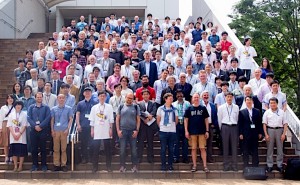The 2018 Asian Linear Collider Workshop (ALCW2018) is being held in Fukuoka, Japan from 28 May to 1 June. At the meeting a statement was unanimously endorsed stressing the scientific importance of the ILC and urging the Japanese government to declare interest in hosting the project. A decision is now urgent because the European Strategy Group, which supported European participation in the ILC in the last update in 2013, needs input by the end of 2018 if the Project is to be integrated into their report. The Fukuoka declaration follows.
Towards the realization of the International Linear Collider, an update
Scientists who gathered for the Linear Collider Workshop in Tokyo in 2015 issued a statement confirming their strong support for the scientific justification for a prompt realization of the International Linear Collider (ILC). The Linear Collider Collaboration (LCC) and the worldwide participants at the 2018 Asian Linear Collider Workshop (ALCW2018) in Fukuoka, Japan, reconfirm the scientific importance of the ILC. We are closer to the realization of the project, but it is now in a critical phase.
- Results to date from the CERN Large Hadron Collider indicate that we are at a crossroads in our quest to uncover the origin and history of the Universe. We now know that precision measurements, in particular of the properties of the Higgs boson, are an essential next step to advance our understanding. Precise measurements in electron-positron interactions at a center of mass energy of 250 GeV at the ILC will deliver a leap in our scientific knowledge and, together with future results from the LHC and SuperKEKB, will propel us toward the ultimate theory of particle physics and a deep understanding of the Universe itself.
- We have been preparing for the ILC for many years, in collaboration with industries and in discussion with governments worldwide. The ILC is now the most mature and realizable electron-positron collider project, and offers the energy expandability of a linear collider. The successful operation of the European XFEL in Hamburg and recent advances in the superconducting R&D in Fermilab near Chicago and other laboratories, together with a cost reduction by changing the initial center of mass energy to 250 GeV, increases the ILC technical and financial feasibility whilst maintaining the physics potential of the machine at this energy. The superconducting technology being developed for the ILC has a great impact on industrial and medical applications of accelerators. We deeply appreciate the evaluation process by the Japanese government for the proposal based on the new ILC design.
- The ILC can only be realized as an international project, and a nation who wishes to host the project should lead the international negotiations.A positive message from the Japanese government expressing readiness to initiate these discussions this year is critically important because work on the update of the European Strategy for Particle Physics, including collaboration in the ILC construction, will start early next year. This update will have a large impact outside Europe on the future of high energy physics projects worldwide. While we will strongly present the scientific case for the ILC in these discussions, it is essentialto hear a positive message from the Japanese government in a timely manner.
Lyn Evans, LCC Director
For scientists from LCC and ALCW2018



Recent Comments